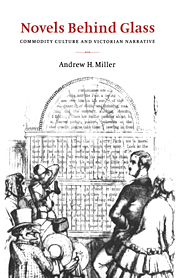Book contents
- Frontmatter
- Contents
- List of illustrations
- Acknowledgements
- Introduction
- 1 Longing for sleeve buttons
- 2 Spaces of exchange: interpreting the Great Exhibition of 1851
- 3 The fragments and small opportunities of Cranford
- 4 Rearranging the furniture of Our Mutual Friend
- 5 Owning up: possessive individualism in Trollope's Autobiography and The Eustace Diamonds
- 6 Middlemarch and the solicitudes of material culture
- Afterword
- Works cited
- Index
1 - Longing for sleeve buttons
Published online by Cambridge University Press: 17 August 2009
- Frontmatter
- Contents
- List of illustrations
- Acknowledgements
- Introduction
- 1 Longing for sleeve buttons
- 2 Spaces of exchange: interpreting the Great Exhibition of 1851
- 3 The fragments and small opportunities of Cranford
- 4 Rearranging the furniture of Our Mutual Friend
- 5 Owning up: possessive individualism in Trollope's Autobiography and The Eustace Diamonds
- 6 Middlemarch and the solicitudes of material culture
- Afterword
- Works cited
- Index
Summary
I tried in vain to convince the fine folks at Mrs. Fox's that revolution was upon us: that we were wicked in our scorn of the people. They all thought there was poverty & discomfort to be sure, but that they were pretty good in themselves; that powder & liveries were very decent & proper though certainly absurd – the footmen themselves would not give them up.
William ThackerayThe allegoricist with the commodity is in his element.
Walter BenjaminThe translation of political revolution into domestic insurrection, understood as the desire of servants to discard the appurtenances of subjection and acquire the material possessions of their masters, is one of William Thackeray's obsessive concerns in the late 1840s. The liveried footman, whose job is to announce himself as his employer's packaged possession, adorned in clothes that he can not afford to buy but must wear to represent his master's wealth, is for Thackeray a logical extreme of a culture fashioned from commodities; and his nervous suggestion to “the fine folks at Mrs. Fox's” that these members of the “vicarious leisure class” might reject their commodification registers his anxiety over the consequences of that culture. Even as the threat of revolution recedes, Thackeray continues to see the commodity as a rebarbative form, inhuman in its blithe disregard of individuals. At the same time, however, his fascination with footmen emerges from his own intense engagement with these commodities; despite his criticism of what Lukács would later call the “reified mind,” Thackeray remains deeply invested in the processes that produce the multifarious material objects surrounding him. Desire for these goods fully implicates him in the economic system he simultaneously decries.
- Type
- Chapter
- Information
- Novels behind GlassCommodity Culture and Victorian Narrative, pp. 14 - 49Publisher: Cambridge University PressPrint publication year: 1995



